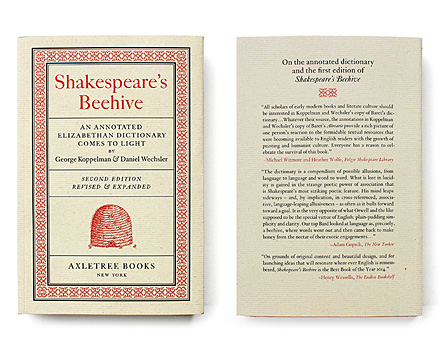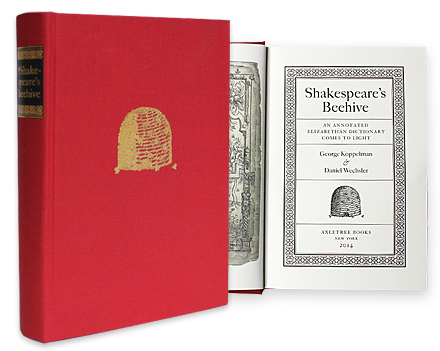Prologue
Introduction to Shakespeare's Beehive
“Baret was in effect the standard English dictionary of Shakespeare’s schooldays, and must have had powerful influence in shaping the English definitions of Shakespeare’s generation. But it is not likely that Shakespeare would have preserved the patterns so accurately if he had not himself turned many a time and oft to Baret for his varied synonyms.”
– T.W. Baldwin on John Baret’s Alvearie
The understanding that Shakespeare relied heavily on source books is not a matter of serious dispute. That being said, long before we acquired our copy of Baret’s Alvearie, we were well aware that there are no formally accepted examples of particular books that can be traced to Shakespeare’s ownership or use. Our speculation, the driving force behind our study, is that Baret’s Alvearie is indeed part of the canon of source material, and is predicated on Baldwin being correct: that in the course of his intellectual development, Shakespeare did turn to Baret, not once or twice, but “many a time and oft.” We imagine that this argument will represent a portion of the debate going forward, but of course there is a much more serious claim that we are presenting.
The question is, does it make sense to imagine any book extensively written in by Shakespeare to realistically survive entirely unnoticed to the present day? Although extraordinarily large numbers of books printed centuries ago have survived, it seems almost impossible to imagine that enough evidence could be found in an annotated book that would both support the idea that Shakespeare was the annotator, and still leave us with an explanation for why no one had ever previously made the suggestion. We understood from the very beginning that any summary would need to confront the apparent impossibility of the claim even before the details of the argument entered the discussion.
In simplest terms it goes as follows: with Baret’s Alvearie we are faced with a book that has not once been reprinted since 1580. A most obscure book. A humble copy. An extensive network of annotations that, through obscurity and a lack of attention, comes to light only now, never previously studied or speculated upon. These are the basic stepping-stones to providing plausibility to the dream that such a monumental discovery is possible. The rest is in the evidence.



